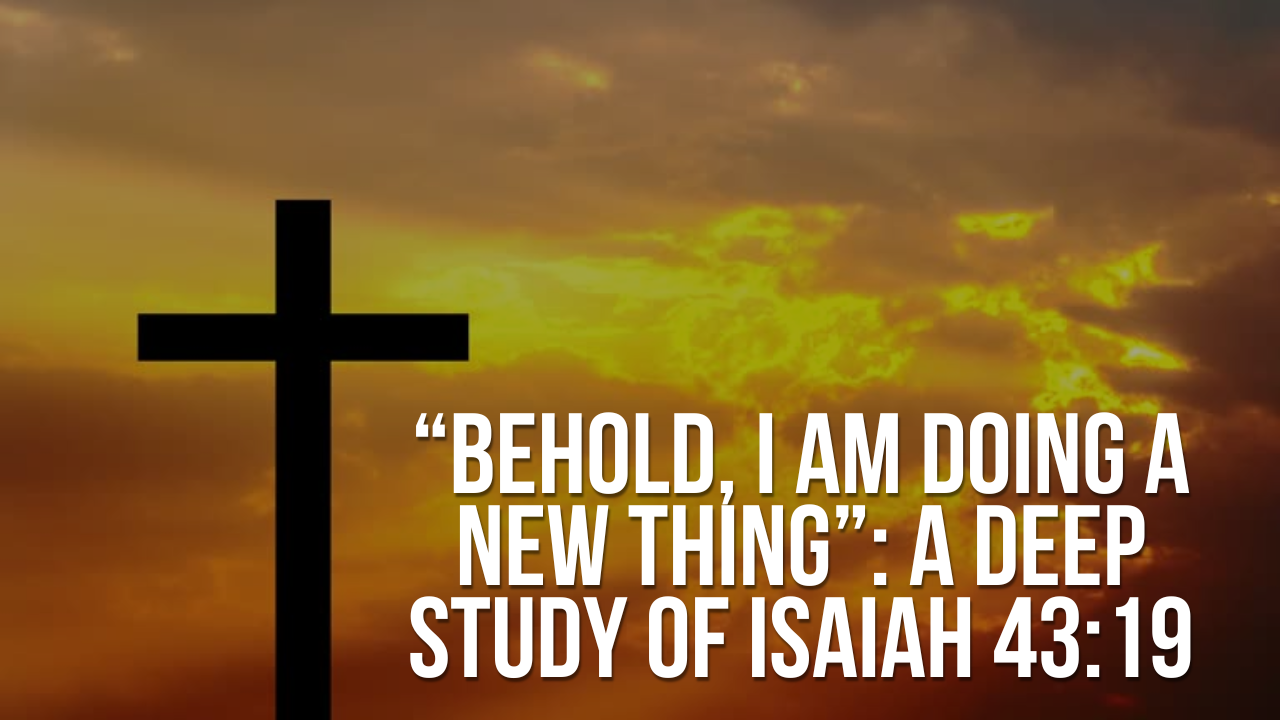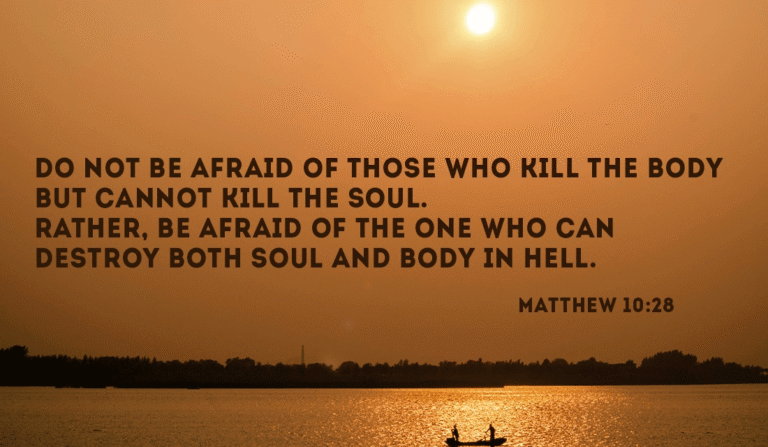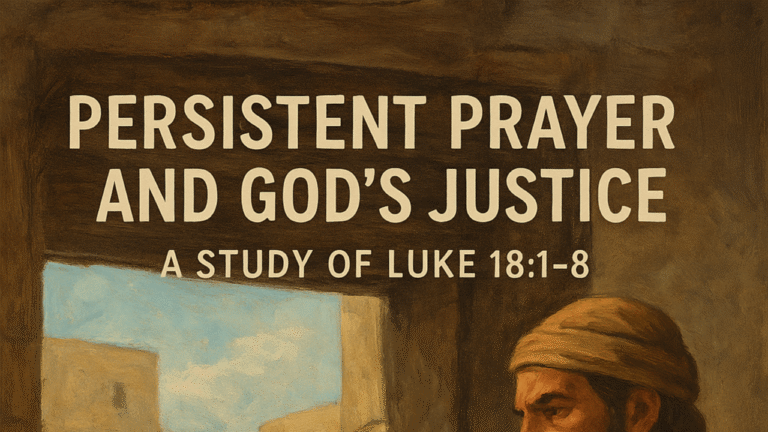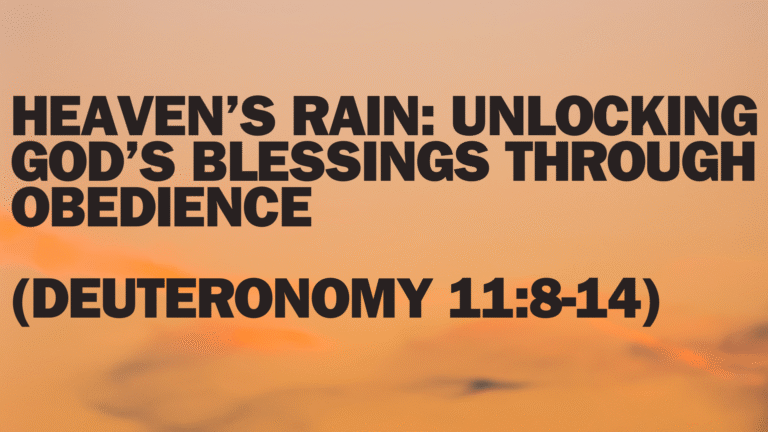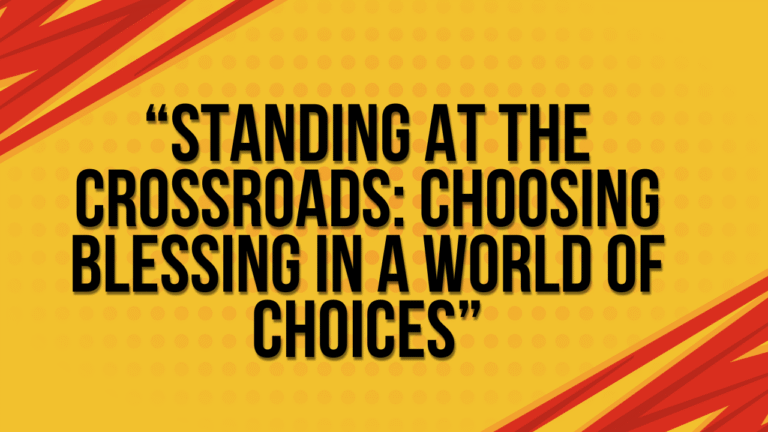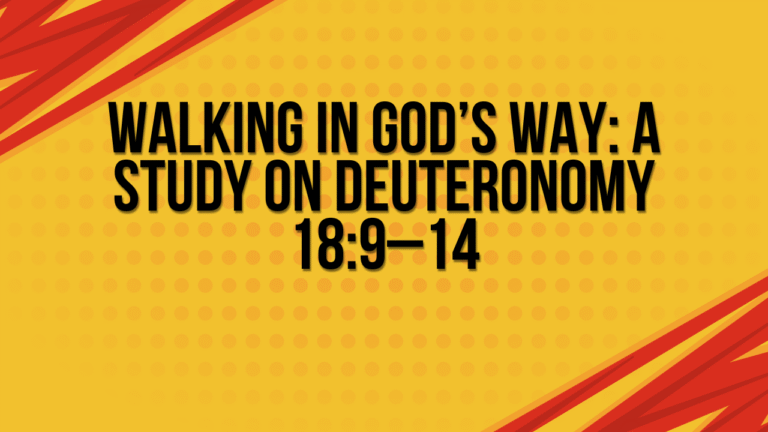“Behold, I Am Doing a New Thing”: A Deep Study of Isaiah 43:19
Introduction
Few verses in the Old Testament capture the imagination and inspire hope quite like Isaiah 43:19:
“Behold, I am doing a new thing; now it springs forth, do you not perceive it?
I will make a way in the wilderness and rivers in the desert.” (ESV)
This verse is often quoted in sermons, devotionals, and even personal encouragements. It speaks to the human longing for renewal, breakthrough, and the hope that God is not finished with His people.
Isaiah 43:19 is more than a poetic promise; it is a declaration from the mouth of God to a weary, exiled people. It reassures them that their captivity, suffering, and despair are not the end of their story. Instead, God is about to write something new, unexpected, and glorious.
In this article, we will take a deep dive into this verse, exploring its historical background, literary structure, theological depth, practical applications, and relevance for modern believers. Through this journey, we will see that God’s promise of “a new thing” is both timeless and timely—an invitation to trust His power to make a way where there seems to be no way.
Historical and Literary Background
To understand Isaiah 43:19 properly, we must first set it within its historical and literary context.
The Book of Isaiah
The book of Isaiah is one of the most theologically rich and complex books in the Old Testament. It is often divided into three major sections:
-
Chapters 1–39: Warnings of judgment and calls to repentance.
-
Chapters 40–55: Comfort and hope for Israel during exile.
-
Chapters 56–66: Future restoration and ultimate salvation.
Isaiah 43:19 falls within the second major section (often called “Deutero-Isaiah”), which focuses on comfort and hope for Israel as they endure Babylonian captivity.
Exile and Despair
By this time, the people of Israel had experienced devastating loss: Jerusalem destroyed, the temple burned, and many exiled to Babylon. They wondered if God had abandoned them forever.
Into this hopelessness, God speaks through the prophet: “Behold, I am doing a new thing.” The message is clear—exile is not the end. God is about to act powerfully to redeem and restore His people.
Literary Setting
Isaiah 43 is part of a larger section where God reassures Israel of His covenant faithfulness. In the previous verses, He reminds them of the Exodus—the great deliverance from Egypt—but then shifts their focus:
“Do not remember the former things, nor consider the things of old. Behold, I am doing a new thing.” (Isaiah 43:18–19)
This shift emphasizes that God’s past works, while great, are not the limit of His power. He is not bound by what He has done before; He is always capable of something new.
Verse Breakdown
“Behold, I am doing a new thing”
The word “Behold” is a call to attention. It’s as if God is saying: “Pay close attention! Don’t miss this!”
The phrase “a new thing” suggests something unprecedented, fresh, and beyond human expectation. For Israel, this meant deliverance not through another exodus across the Red Sea, but through a completely new path—God would open a way through the wilderness and provide rivers in the desert.
“Now it springs forth, do you not perceive it?”
Here, the imagery is agricultural. The “new thing” is like a seed breaking through the soil, bursting into visible life.
But the question—“Do you not perceive it?”—reveals a problem: God’s people often fail to recognize His work while it is happening. Spiritual blindness, discouragement, and fixation on the past can make us miss the new thing God is doing right before our eyes.
“I will make a way in the wilderness”
The wilderness in Scripture represents barrenness, danger, and wandering. For Israel, the wilderness was associated with their journey after the Exodus—a place of trial, testing, and scarcity.
God’s promise is stunning: He will create a path in the very place that symbolizes lostness and despair. Where there is no way, God Himself will make one.
“And rivers in the desert”
Water in the desert is the ultimate image of life in impossible conditions. Deserts are lifeless, dry, and hostile to growth. Yet God promises to create rivers—abundant, flowing streams—right in the midst of desolation.
This is more than survival; it is abundance. God’s provision is not minimal; it is overflowing, transforming barren places into life-filled landscapes.
Theological Themes
1. God as Creator of New Beginnings
This verse highlights God’s identity as the One who constantly brings renewal. Just as He created the heavens and the earth, He continues to bring forth new realities.
2. God’s Sovereignty and Power
No wilderness or desert is too barren for God. His power is not limited by circumstances, geography, or human imagination.
3. Hope in Impossible Situations
Isaiah 43:19 assures us that despair is not the final word. God’s “new thing” emerges precisely in places of greatest hopelessness.
4. Christ as the Fulfillment
Ultimately, the “new thing” finds its fullest meaning in Christ. Through His death and resurrection, Jesus brought a new covenant, a new creation, and the living water of eternal life.
Applications for Today
Isaiah 43:19 is not just a historical promise for Israel; it speaks powerfully to our lives today.
1. Personal Renewal
Many of us face seasons of wilderness—times of confusion, loss, or dryness in our spiritual lives. God’s promise reminds us that He can bring streams of life even in those deserts.
2. Letting Go of the Past
Just as Israel was told not to dwell on past deliverances, we too must release our attachment to “the good old days.” God has more in store than what He has already done.
3. Church Renewal
For churches that feel stagnant, Isaiah 43:19 is a call to expect revival. God can breathe new life into dry bones and open doors for mission in unexpected ways.
4. Societal Hope
In a world plagued by injustice, division, and despair, Isaiah 43:19 assures us that God is still at work. He is making new ways toward peace, justice, and restoration.
Examples and Illustrations
Biblical Examples
-
Exodus: God made a way through the Red Sea.
-
Joseph: Betrayed and imprisoned, yet God raised him to save nations.
-
Early Church: Persecution scattered believers, but it spread the gospel worldwide.
Historical Examples
-
The Protestant Reformation: A new move of God that revived biblical truth.
-
The Great Awakenings: Times when dry spiritual landscapes were flooded with revival.
Modern Testimonies
Countless individuals testify of God bringing new life out of addiction, depression, financial ruin, or broken relationships. God still makes rivers in deserts today.
Practical Steps to Embrace God’s “New Thing”
-
Stay Spiritually Alert: Train your eyes to look for God’s hand in small beginnings.
-
Release the Past: Don’t let nostalgia or regret blind you to what God is doing now.
-
Trust God’s Timing: Seeds take time to grow; rivers take time to flow.
-
Walk by Faith: Step into the wilderness believing God will create a path.
-
Remain Open to Change: God’s “new thing” may not look like what we expect.
Conclusion
Isaiah 43:19 is more than ancient poetry; it is a living word of hope. To a broken, exiled people, God promised new beginnings, unexpected provision, and miraculous pathways.
Today, the same God speaks to us: “Behold, I am doing a new thing.”
Wherever we feel trapped in wilderness or dried out in deserts, God is able to bring forth life, renewal, and breakthrough. Our task is to perceive it, to trust Him, and to step forward in faith.
So let us hold fast to this promise. For the God who parted seas, who raised dry bones, and who raised Christ from the dead is still the God who makes a way in the wilderness and rivers in the desert.
Devotional God promises in Isaiah 43:19, “Behold, I am doing a new thing.” This verse reminds us that no wilderness is too dry and no desert too barren for His power. Just as He opened a way for Israel in exile, He can bring fresh hope and new beginnings into our lives today. Sometimes we miss His work because we’re focused on the past or blinded by present struggles, but God is already causing new life to spring forth. He makes streams flow where there is only dryness and paths where there seems to be no way. Whatever your situation, trust that God is still writing your story and that His “new thing” will bring life, joy, and renewal.
Prayer:
Heavenly Father, thank You for being the God who makes a way in the wilderness and brings rivers in the desert. Help me to let go of the past and open my eyes to the new things You are doing in my life. Strengthen my faith to trust Your timing and follow Your path, even when I cannot see the way ahead. Renew my heart with hope, and let Your Spirit refresh me daily. In Jesus’ name, Ame

